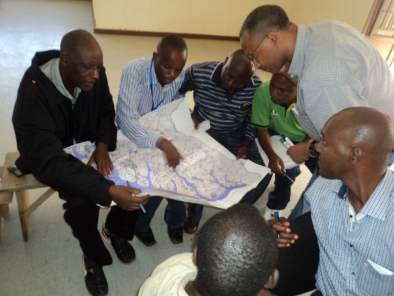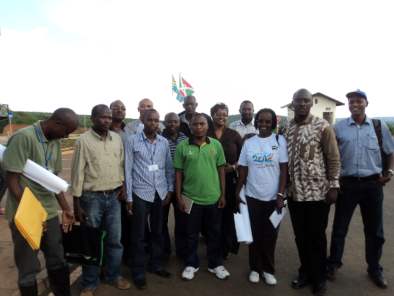The situation analysis will be carried out for the whole Lake Chohoha catchment covering socio-economic , gender , natural resources/environmental , agricultural potential and water resources assessments.
A multidisciplinary Team of Experts drawn from different partner organizations in the two countries will conduct a six-day intensive field work.
Field work and data collection will be focused on the preliminarily identified potential sites for project intervention. On the Burundian side, the data collection and analysis will conducted in Rubuga, Kigina, and Gaturanda in Bugabira Commune of the Kirundo Province, whereas in Rwanda, it will mainly be in Kamabuye Sector of the Bugesera District in the Eastern Province.
Having a team with such multi-disciplinary and technical expertise, Global Water Partnership Eastern Africa (GWPEA) not only expects a comprehensive report, but findings reflective of the multi-dimensional contexts and dynamics of the Bugesera catchment.
Briefing the team, the GWPEA Project Regional Program Manager Mr. Kidanemariam Jembere urged the technical team to harmonize their methodology, enhance team work and reflect on the project’s guiding Terms of Reference (ToRs) specifically the selection criteria for the site where the study will be focusing.
The selection criteria include: having a trans-boundary waters, evident need for intervention (hot spot) and non-duplication. Kidane emphasize that “the chosen project intervention site should “enable the citizens of the two countries to jointly collaborate while managing the shared trans-boundary water and other natural resources.”
The joint planning session for the team of experts resolved to use Focus Group Discussions (FGD), Field Observations, Guided interviews, Document Reviews, GIS tools, Soil sampling and laboratory analysis to generate required data and information.
According to the ToRs, the technical team will assess hydrological, environmental, climatic, socio-economic, legal and institutional analysis. The team will assess risk factors such as the likelihood of extreme events: floods, drought, unfriendly human practices and thereafter propose workable recommendations.”
The technical team physically explored the potential study areas, discussed the boundaries of the catchment area, consulted local leadership and citizens (see team analyzing the site map).
The study follows a consultative process that brought together local government officials from Rwanda and Burundi to garner their ownership and buy-in

Historically, Bugabira (Burundi’s commune) and Bugesera District (Rwanda’s) face persistent drought caused by changing climate and unfriendly human practices such as over-cultivation, deforestation and unregulated livestock farming methods.
The Vice Mayor for Economic Affairs of Bugesera District, Julius Rukondo reflected about Bugesera’s past gradual path to desertification and how collaborative efforts saved it. He said: “through joint cooperation between the Government and development partners, the area has regained its naturalness. GWPEA comes in to drive the process towards sustainability.”
In Eastern Africa, WACDEP will be implemented at Kagera basin, Rwanda-Burundi national level and Bugesera Trans-boundary water catchment. In the long term, WACDEP seeks to achieve “a higher level of water security and climate resilience in the countries of Burundi and Rwanda” the envisioned project impact reads in part, whereas its expected outcomes are:
- Water security and climate resilience integrated in development planning and decision-making processes Burundi and Rwanda;
- Capacities of partnerships, institutions and stakeholders in Burundi and Rwanda enhanced for climate change adaptation and sustainable water resources management in a trans-boundary setting in Bugesera catchment, and at higher level in Kagera basin.
- “No regrets” investment and financing strategies for water security, climate resilience and development formulated and governments of Burundi and Rwanda begin to implement them;
- Community-based climate adaptation and water security actions defined and implemented for demonstration or piloting purposes in Bugesera catchment;
- Useful knowledge and information on climate resilience and water security generated and disseminated among stakeholders in Eastern Africa;
Links for the Situation Analysis story
http://www.gwp.org/en/WACDEP/NEWS-AND-EVENTS/News-Archive/-Workshop-for-the-Launching-of-Rwanda-Burundi-Transboundary-Project-in-Bugesera-Catchment-/
http://www.gwp.org/en/gwp-in-action/Eastern-Africa/News-and-Activities-GWP-Eastern-Africa/WACDEP-kicks-off-with-Stakeholder-Consultations-in-the-local-Bugesera-Transboundary-Basin-shared-by-Rwanda-and-Burundi/
